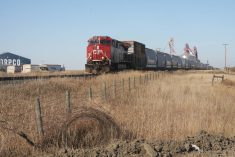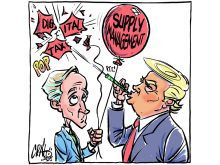I am writing in response to the article, “Inhumane slaughter caught on video” in the April 8 edition of The Western Producer.The vet just left, leaving me with a bill of more than $600. I had the teeth of an older mare floated ; she has lost a lot of teeth and has developed insulin resistance. She will require a specialized diet and care to live out the remainder of her life.This mare had been through a lot of homes and abuse before she came to me. She hasn’t got another home left in her. I have another mare, my best broodmare, which suffered a broken knee last fall. We brought her through the winter, hoping to breed her in the spring. She aborted.These two mares have reached the end of “the green mile.” Adoption isn’t an option for either of them.I have three choices. I can have the vet euthanize them and call the rendering truck to remove them for about $400 each.Or, I can call the neighbour to bring his rifle, drag the carcasses away with the tractor, and let the coyotes have at them. Or, I can make an appointment at the plant, hold them while they get the bolt and get about $200 above my costs of transport.It will be a hard day, a very hard day. But as a responsible livestock producer, I have to make tough decisions, weighing the balance between economic bottom lines and animal welfare.Where there is livestock, there is deadstock, and horses are livestock, not pets.Right now, that $200 is the difference between whether we have to go to the food bank this month or not. Because of horse rescue, banning the slaughter in the United States, and Wyeth terminating contracts of remaining PMU barns in Saskatchewan, the oversaturated Canadian horse market has demonstrated it does not have a bottom.On the other hand, lamb prices have been steadily rising over the past nine months. For the first time in years, it pays to be in the sheep business. But somehow the media has missed this. There are no stories, pictures or videos of the proverbial lambs being led to slaughter.Why all the fuss about horses? That’s easy, on three counts. Until the mid-20th century, human history has been intertwined with horses. They separated those who rode from those who walked. Horses and humans made history and forged new frontiers together.Second, horses have become ingrained in the human psyche, whether you look at the horse as a symbol of virility or as archetypes of collective consciousness.Third, horses have highly developed prey instincts, which means they are able to mirror human predatory behaviour in terms of responses. This is often incorrectly interpreted as emotion or compassion, when it is simply instinct.But these schools of thought, along with warm fuzzies, don’t excuse the vigorous campaigning of politically powerful fringe groups of animal rights activists that would see horse slaughter banned in Canada.Horse flights from Europe land at Toronto, New York, Los Angles and Calgary airports. Since the ban of horse slaughter in the United States, horse flights land every Tuesday and Thursday at Calgary, instead of weekly or biweekly.Horses are loaded three to a pallet with 21 pallets per plane. Most of the contents of these pallets will later be flown to Europe or Asia in brown paper wrap. The horses are exported and reimported so as not to insult the sensibilities of animal rights activists in Europe. Worldwide, 16 percent of the population eats horse meat on a regular basis.Last spring, the Producer reported that Wyeth was not renewing contracts with remaining PMU barns in Saskatchewan. The same week, both national TV networks reported that the price of hormone replacement therapy, dependent on pregnant mare urine, quintupled.At the same time, Wyeth has ramped up production of PMU facilities in China, Kazakistan and Poland, out of the scrutiny of North American values. The byproduct of meat foals has a lucrative market, while Wyeth can continue to make statements relating to supply and demand to justify price of HRT.I have four lovely mares for sale at rock bottom prices. Because of the dissolution of the PMU barns, there is a glut of well-bred mares on the market with limited or no training. We’ll put money into training this spring and summer and try to find new homes for them.But when fall comes, if they haven’t sold, these mares will be sent to auction. If they are not purchased for riding, the meat buyers will be there. That’s my reality, no matter how much I love my horses. I have payments to make.My horses are not “rescue” horses. They are being offered for sale so we can keep the farm. Perhaps I should starve them and beat them so they qualify as rescue candidates.Our society has created a culture of rescue, where rescue has become the norm rather than the exception.We cannot afford to lose horse slaughter in Canada as an option until we have addressed personal and corporate responsibility in an effective way. We must do everything we can to reinstate slaughter in the U.S. to help stabilize and regrow the horse industry in Canada.So, to all you city living, chardonnay sipping, animal rights activists, until you have walked a mile in my shoes, keep your noses out of my agribusiness.
Read Also

Agriculture needs to prepare for government spending cuts
As government makes necessary cuts to spending, what can be reduced or restructured in the budgets for agriculture?
















